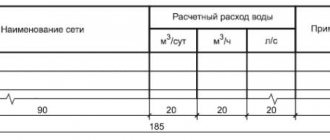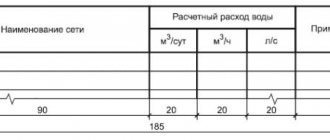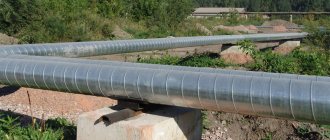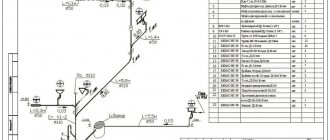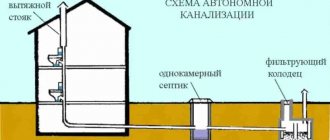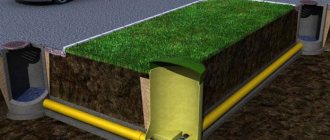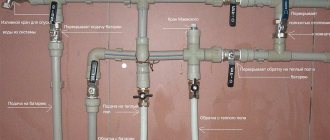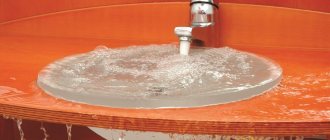Main rules to always remember
In the Russian Federation, the operation of sewerage and water supply systems is carried out in accordance with the Rules approved back in 1995 by order of the Ministry of Construction number 17-94. The document regulates the relationship between water and utility services organizations (water and communal services of settlements) and users - organizations and individuals.
Using the video in this article, we will give a brief tour of the requirements set out in the rules: we will talk about the rights and obligations of the parties, the procedure for connecting to water supply and drainage systems, and its accounting.
Functions of utility systems
Utility networks for supplying drinking water and draining sewerage combine technical units of varying complexity that carry a specific functional load associated with:
- extraction of fresh water to meet the needs of the population and technological lines;
- filtration, disinfection and bringing produced natural water to drinking standards;
- drainage of wastewater, its collection, treatment and subsequent disposal;
- pumping and transporting liquids through water supply and sewerage systems.
Utility networks are formed to meet the needs for drinking water and wastewater disposal:
- legal entities - enterprises, organizations, objects of social, cultural, administrative and other purposes;
- individuals - owners of apartments and private houses, cottages, dachas and other privately owned buildings that are not used as objects directly or indirectly involved in the process of carrying out activities by legal entities.
Utility energy supply systems are accounted for, maintained and repaired by the relevant utility companies of various forms of ownership. They also perform the functions of designing water supply and sanitation systems for objects of various industries.
Utility companies will also have to coordinate water supply, sewerage and heating projects for a private home, industrial facility or structures for other purposes that are connected to common systems.
Terms of use
Owners of apartments in a multi-storey building or private building must comply with the rules for using sewerage and water supply. This will help avoid emergencies in water supply and wastewater disposal systems.
When operating the sewer network in a multi-storey or private building, residents should adhere to the following recommendations:
- Plumbing fixtures are used carefully; even a minor breakdown can cause an unpleasant situation for neighbors.
- Substances that tend to ignite quickly should not be drained into the sewer system.
- Do not throw large debris or other objects into the toilet that could cause a blockage in the sewer pipes.
- If a breakdown or malfunction of the sewer system is detected, you must make a statement to the appropriate service. It would be a good idea to notify your neighbors about the current situation.
- It is prohibited to use the toilet if there is a blockage in any part of the sewer system until the problem is resolved.
- Special screens should be installed at the drain hole of the sink or kitchen sink. They retain large fractions in the draining liquid and prevent clogging of the pipeline.
- Special filters are installed on the drain of the washing machine. They prevent hair, fur and threads from clothing from entering the drain.
- It is necessary to regularly prevent blockages in pipes. Cleaning of outlets from sinks, sinks, bathtubs or showers is carried out with products that contain active acid or alkali.
Legal aspects of ensuring the functioning of systems
The legal framework in the Russian Federation regulating the technical operation of public energy supply systems in the field of supply of drinking water, water consumption, drainage and disposal of wastewater is the “Rules for the use of public water supply and sewerage systems in the Russian Federation.”
The Rules were put into effect on the territory of Russia in 1999 on the basis of Decree of the Government of the Russian Federation N 167. The modern edition of the Rules takes into account changes made in 2003, 2006, 2012, 2013 and 2015.
These Rules stipulate points regarding:
- relations between suppliers and consumers of services formalized by relevant agreements;
- accounting for the consumed volume of water and discharged wastewater based on the readings of instruments installed and sealed by employees of the service company;
- responsibilities and rights of the utility company and the subscriber;
- monitoring the compliance of drinking water and wastewater with established standards;
- warnings in effluents of substances prohibited for discharge into public waste systems;
- mode of operation, maintenance and repair of energy supply systems;
- issues of termination and resumption of the process of providing drinking water resources and receiving discharges.
The activities of utility companies are often characterized as a monopoly right to provide public services for water supply and wastewater disposal. This fact necessitates government regulation of the basic activities of utility companies, no matter what form of ownership they have.
Chemical cleaning
Maintenance of the sewer system at the cleaning stage may involve the use of a chemical method, which involves the use of potent reagents. They allow you to soften and then transform condensate-type deposits, including salt deposits, which are converted into a dissolved state during the cleaning process. This process is carried out using special equipment working in tandem with a foamed chemical composition. The latter makes it possible to treat surfaces with high efficiency and specifically concentrate the impact that the reagents have. Foam also creates the effect of mechanical impact.
Maintenance using the dry cleaning method is very effective and environmentally friendly, but has a high cost and is therefore rarely used.
Rationing, accounting and payment for services
Photo No. 2
Connection to public networks for supplying drinking water and draining wastewater is carried out on the basis of an agreed water supply (sewage) project for a private house (other facility). In this case, an agreement is concluded with energy service providers.
A water supply project for a private house or other structure necessarily requires the presence of a technical unit for metering consumed water. Calculated indicators indicating possible volumes of water consumption are also taken into account.
When servicing industrial facilities or farms that are characterized by seasonal increases in production volumes, which lead to a corresponding increase in water consumption and more waste discharges into sewers, the utility company requires advance notice of the planned increase in service consumption.
If the heating system in the house provides for water heating without connection to centralized coolant lines, an appropriate heating project for a private house is required, which is also agreed upon by the utility company.
The consumer - the owner of a private house or other facility - pays the cost of the volume of water taken from the public water supply network and the service of disposing of contaminated water in accordance with current tariffs and within the terms established by the contract.
If there is a debt to pay for services received, the subscriber is sent a request to repay the amount of debt owed to him within a specific period. If the claim is outstanding after the deadline, the company stops dispensing drinking water until the debt owed to the subscriber is paid.
The consumer transmits the readings of the metering device, which has the seal of the corresponding service provider, to the dispatch service independently. But if necessary, the utility company sends a controller to check the readings, whose free access to the accounting unit is ensured by the owner of the facility.
The consumer has the right to demand from the service provider:
- compliance of drinking water with established standards;
- compliance with the water supply regime;
- urgently eliminate emergency situations.
Utility companies accept requests from the population, organizations, enterprises and institutions regarding issues of water supply and wastewater disposal, and coordinate them if they:
- arrive in advance;
- do not lead to deterioration of the functional structure of utility networks;
- do not harm the environment or human health.
How is consumable and sewage water accounted for?
Both the volume of water supplied and the amount discharged must be taken into account through the use of water metering units. The only place where potable water is not counted is in fire stations when it is used to fill tanks.
Water metering unit
- When the device is faulty, the amount of water is determined by the average calculated based on consumption over the last three months - but only for one billing period.
- If the meter is not repaired during this time, this is no longer considered as a malfunction, but as an evasion from installing the device, and the calculation is made differently.
- In this case, the flow rate is calculated based on the throughput of the system at a flow speed of 1.5 m/s around the clock. In this case, the volume of water discharged is assumed to be equal to the volume consumed, and recalculation is not performed after installing the meter.
- So, rushing to repair or replace devices will cost much less. The same measures are taken if the subscriber has not provided the controller with access to the water metering unit, as well as if unauthorized tapping or construction of structures for connection to pumps, hydrants, etc. is detected.
Where water supply is carried out according to a temporary scheme without metering devices, the procedure for payment with the supplying organization is determined by the relevant agreement.
What does a breach of contract entail?
If the consumer violates the established procedure for paying for the volume of water supply and wastewater services received, the utility company has the right to suspend the provision of services.
And in case of systematic violations of the obligations stipulated by the concluded contract, the enterprise can unilaterally terminate the contract with the consumer by disconnecting the facility from the drinking water supply network and sewer system.
If industrial facilities, farms, or private properties are found to be discharging wastewater not into the sewer network, but directly into the environment, fines are imposed on such violators. And environmental pollution with harmful substances may even entail criminal liability for the person who allowed or authorized such a discharge.
Violation of contractual obligations by employees of a utility company is recorded in an act, on the basis of which the consumer has the right to demand a recalculation of payment or compensation for damage incurred, determined as a result of untimely repairs, elimination of an accident, or other actions or inaction of utility workers.
Previous articles Next articles
Related Posts
- 12.07.2016.
Do-it-yourself construction of external water supply and sewerage networks
- 12.07.2016.
Wastewater meters: how to choose the right one?
- 26.06.2016.
Heating, water supply and sewerage for the improvement of a country house
- 20.06.2016.
Hydrodynamic cleaning
The hydrodynamic method is effective and can restore pipe patency. In order to ensure a trouble-free process of cleaning the sewerage system using the hydrodynamic method, during installation and subsequent repairs it is imperative to provide an opportunity to provide access to each section of this system. Otherwise, it will not be possible to avoid significant financial costs and the need to restore the damaged interior.
The hydrodynamic method of cleaning sewer systems has many advantages. Thus, the cleaning process is carried out efficiently and quickly, in addition, there is a guarantee of the safety of the pipes. This method extends the service life of the drainage system, due to the gentle effect of the water jet. The hydrodynamic method can be used for internal wiring of any complexity. The method is environmentally friendly, since there are completely no harmful chemical effects on the pipeline and the external environment, and there are no emissions of dust and dirt during the operation of the installation. The method allows for cleaning at sub-zero temperatures, which is sometimes indispensable when system elements freeze and ice plugs form in pipes.
Maintaining sewer systems using hydrodynamic equipment is cheaper than replacing pipes if you are faced with the need to restore pipe patency.
Sewerage maintenance, which involves cleaning the system elements using a hydrodynamic method, ensures the injection of a jet under a pressure of 150 atmospheres. Depending on certain conditions, the nozzle of the unit is supplemented with a nozzle, which can be, for example, rotary, punching, or others. The reactive force forces the nozzle to move inside the pipe, the body breaks through the blockage, and jets opposite to the movement of the nozzle remove contamination from the walls.
Maintenance of the system, which involves cleaning the pipes, can be done using a Karcher mini-wash. It uses pressurized water. In order to flush sewer systems, you will need to purchase a flexible hose and a set of nozzles. Some models will provide cleaning of areas whose length reaches 15 m. The use of special nozzles will allow you to clean pipes of any diameter.
Turnkey external sewerage in Moscow and the region
Turnkey external sewerage in Moscow and the region is in quite high demand, because professionals who will arrange everything from A to Z and provide a guarantee for the work performed are often cheaper than correcting errors during independent installation.
Turnkey external sewerage in our company is carried out by craftsmen with at least 8 years of experience. The Mosvodostroy company provides a guarantee for all work performed, uses only certified materials and helps you choose the most successful autonomous sewage system for your site. If you are planning to install a turnkey external sewer system anywhere in Moscow or the region, just fill out an application and our specialists will quickly calculate the estimate so that you can get acquainted with the real budget, and not approximate figures.
Storm drain maintenance
Maintenance of storm sewer networks involves cleaning the receiving tanks from sand, debris and other foreign objects. In addition, work is being carried out to replace worn out trays, underground pipes, and other elements. Technical work is carried out on the pressure sections of the system - repair of pumps, replacement of filters. An inspection is carried out to check the condition of metal parts prone to corrosion.
The specific operation of stormwater systems is seasonal. This means that the internal cavity of the pipes is empty for some time. Rodents and birds can live there, and garbage can accumulate there. Checking the condition of channels or rainwater collectors allows you to detect unwanted elements in time and immediately remove them from the system. This work is carried out in the fall, after the end of the rainy season. The second check is carried out in the spring, before active snow melting begins.

